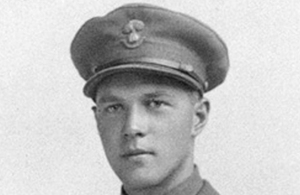WW1 Canadian VC recipient Samuel Lewis Honey
The story of Canadian First World War Victoria Cross recipient Samuel Lewis Honey.

Samuel Lewis Honey [Credit: National Defence Canada]
70 men from Canada received the Victoria Cross, Britain’s highest award for gallantry, during the First World War. As part of the Centenary Commemorations the people of the United Kingdom marked their gratitude to those courageous men by presenting a bronze memorial plaque to their home country engraved with their names. The plaque is now displayed at the British High Commission Ottawa. This archive tells their stories.
Name: Samuel Lewis Honey
DOB: 9 February 1894
Place of Birth: Conn, Ontario, Canada
Date of Action: 27 to 30 September 1918
Place of Action: Bourlon Wood, France
Rank: Lieutenant
Regiment: 78th Infantry Battalion, Canadian Expeditionary Force
Samuel Lewis Honey was born on 9 February 1894 in Conn, Canada. He was a school teacher before enlisting in the Canadian Expeditionary Force in January 1915. In 1917 he earned the Military Medal and then the Distinguished Conduct Medal, the latter for his actions at Vimy Ridge. He was later commissioned and served with the 78th Infantry Battalion.
Lieutenant Honey was posthumously awarded the Victoria Cross for his bravery during the Bourlon Wood operations in France, from 27 September 1917 until his death 3 days later. His citation explains further:
On 27th September, when his company commander and all other officers of his company had become casualties, Lt. Honey took command and skilfully reorganised under very severe fire. He continued the advance with great dash and gained the objective. Then finding that his company was suffering casualties from enfilade machine-gun fire he located the machine-gun nest and rushed it single-handed, capturing the guns and ten prisoners. Subsequently he repelled four enemy counter-attacks and after dark again went out alone, and having located an enemy post, led a party which captured the post and three guns. On the 29th September he led his company against a strong enemy position with great skill and daring and continued in the succeeding days of the battle to display the same high example of valour and self-sacrifice. He died of wounds received during the last day of the attack by his battalion.
Lieutenant Honey was buried at the Queant Communal Cemetery in Pas de Calais. He is commemorated by a memorial plaque in Mount Forest, Ontario.